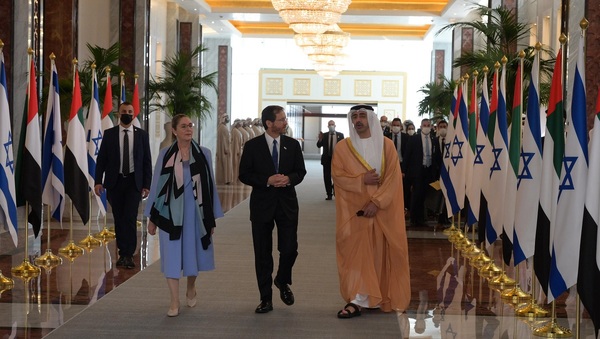
(function(d, s, id) { var js, fjs = d.getElementsByTagName(s)[0]; if (d.getElementById(id)) return; js = d.createElement(s); js.id = id; js.src = “https://connect.facebook.net/en_US/sdk.js#xfbml=1&version=v3.0”; fjs.parentNode.insertBefore(js, fjs); }(document, ‘script’, ‘facebook-jssdk’)); –>
–>
January 1, 2024
Israel winning its war against Iran’s proxies in the Gaza Strip is an opportunity to implement reforms necessary for reconciliation and long-term peace. Israel, the United States and other western powers lack legitimacy in the Muslim world, and their taking the lead would undermine the project from the outset. Israel will not empower the UN, UNRWA, or like international institutions that have so amply demonstrated their hostility. There are few good options, but Saudi Arabia is influential and motivated to deprive Iran of its Mediterranean colony. It also has a growing desire to be part of the modern world order, and is at least amenable to peace with Israel. Perhaps most important, the Arab states are more suited to the sort of generational planning necessary to deradicalize an entire society.
‘); googletag.cmd.push(function () { googletag.display(‘div-gpt-ad-1609268089992-0’); }); document.write(”); googletag.cmd.push(function() { googletag.pubads().addEventListener(‘slotRenderEnded’, function(event) { if (event.slot.getSlotElementId() == “div-hre-Americanthinker—New-3028”) { googletag.display(“div-hre-Americanthinker—New-3028”); } }); }); }
Rebooting an Oslo-style peace process is doomed to fail. The Iranian, rejectionist faction (Hamas, Islamic Jihad, etc.) has only strengthened in the post-Oslo era, and the Palestinian Authority no longer even pays lip service to the idea of coexistence with Israel. Hamas intends to destroy Israel and kill every Jew, and it enjoys overwhelming support both in Gaza and the West Bank. Every peace offer has been met with violence, and the attempt to unilaterally disengage culminated in the worst anti-Jewish attack since the Holocaust.
Israel is laying the groundwork for the generational changes needed for peace by defeating Hamas. Hamas had three goals for the 10/7 attack: breach the Israeli border and kill as many Jews as possible; lure the Israel Defense Forces into a bloody quagmire in Gaza and expose the Israeli north to an invasion by Hezb’allah; and scuttle the then-imminent normalization agreement between Israel and Saudi Arabia. While Hamas achieved an initial tactical victory, it squandered whatever military advantage it had by perpetrating atrocities against civilians, and once word of the invasion spread, Hamas’ forces were forestalled by ad hoc Israeli forces even before the IDF routed the invaders. Despite achieving surprise, Hamas’ casualties from the 10/7 attack approached in number the total Israeli casualties. Hamas may have terrorized the population, but showed itself essentially irrelevant as a military force.
Nor has the vaunted Gaza trap panned out. Prior to the ceasefire in November, Israel showed willingness to rely on air power and other standoff weaponry, which disrupted Hamas operations and kept Israeli casualties relatively low. By systematically severing the Hamas network of tunnels, Israel may have turned a Hamas trap into a trap for Hamas, requiring fewer ground forces than might have been expected and mitigating the risk of popup attacks from concealed positions. Since the end of the ceasefire, Hamas’ preparation and foreign pressure on Israel to decrease use of ordinance has resulted in an accelerated Israeli casualty rate, but Israel has shown little sign of modifying its ground war and its forces continue to push forward more or less at will.
‘); googletag.cmd.push(function () { googletag.display(‘div-gpt-ad-1609270365559-0’); }); document.write(”); googletag.cmd.push(function() { googletag.pubads().addEventListener(‘slotRenderEnded’, function(event) { if (event.slot.getSlotElementId() == “div-hre-Americanthinker—New-3035”) { googletag.display(“div-hre-Americanthinker—New-3035”); } }); }); }
Israel’s success, together with strong early U.S. messaging, has prevented Hezb’allah from opening a second front in the north. Israel has been able to commit a significant deterrent force in the north even while conducting its Gaza operations. The United States reenforced the message by deploying two aircraft carrier groups to the region. While Israel has killed over one hundred Hezb’allah members and suffered relatively minimal casualties in consistent, low-level exchanges of fire since 10/7, Hezb’allah has not attempted any concerted attack. Critically, Israel continues preventive targeting of Iranian assets in Syria, including the recent killing of Iran’s seniormost IRGC leader in the country. Israel can maintain this level of contact indefinitely.
Neither has Iran’s Houthi proxy in Yemen risen to a strategic threat requiring Israeli response. Saudi, U.S., and Israeli forces have intercepted dozens of Houthi drone and missile attacks on Israel, including the world’s first-ever extra-atmospheric missile intercept achieved by Israel’s  Arrow system. Houthi drones and missiles have struck several commercial tankers in the Red Sea and Indian Ocean, causing delays and expenses as shippers temporarily diverted around the Cape of Good Hope. However, a U.S.-led coalition is now patrolling shipping lanes and shipping is returning to normal. The Houthis are effectively inducing a coalition in defense of Israel and global stability, rather than opening a second front threatening Israel’s war effort. Militarily, then, Hamas has failed.
Arrow system. Houthi drones and missiles have struck several commercial tankers in the Red Sea and Indian Ocean, causing delays and expenses as shippers temporarily diverted around the Cape of Good Hope. However, a U.S.-led coalition is now patrolling shipping lanes and shipping is returning to normal. The Houthis are effectively inducing a coalition in defense of Israel and global stability, rather than opening a second front threatening Israel’s war effort. Militarily, then, Hamas has failed.
Hamas’ one lasting victory from 10/7 is Saudi Arabia’s suspension of normalization talks with Israel. Normalization began with the 1979 peace agreement between Israel and Egypt, which ended the wars of Israel’s birth. The peace with Jordan in 1994 was not militarily significant, but represented progress toward regional integration in conjunction with the prior year’s Oslo Accords. Likewise, the 2020 Abraham Accords between Israel and the United Arab Emirates, Sudan, Morocco, and Bahrain reflect a significant diplomatic rather than military breakthrough.
For Israel, normalization with Saudi Arabia would be the most significant diplomatic breakthrough since the 1979 Israeli-Egyptian accord. Saudi Arabia holds immense symbolic importance and influence as Protector of the Two Holy Cities, as well as practical influence through financial sponsorship of religious and civic institutions in the Muslim world. The explosion of mass anti-Israel and anti-Semitic violence and protests around the world suggests that any negotiated peace between Israel and the Palestinians is distinct from acceptance by the “Arab Street” and “Muslim Street.” The Saudi government is well positioned to influence mass opinion. Whether popular sentiment is driving Palestinian rejectionism or vice-versa is debatable, but either way the Saudi government is better able to shift global Muslim and Arab perception of Israel than any other institution in the world. Normalization with Saudi Arabia would be a leap forward for Israel.
For Saudi Arabia, normalization with Israel and midwifing Israeli-Palestinian reconciliation would accelerate its own integration into the modern order, while dislodging its greatest rival’s outpost. The Sunni Saudis and Shi’ite ayatollahs in Iran are champions of competing Islamic factions that have been waging war against each other since the early days of Islam. Notwithstanding the very real and concerning ties between the Saudis and radical extremists, in recent years the Saudis have sought to modernize and join the western order. By contrast, exporting Islamist, revolutionary violence is the very purpose of the ayatollahs’ 1979 Revolution, and they have never been as powerful as they are today in the wake of the U.S. flight from Iraq.
Israel and the Saudis thus face a common enemy, and the Saudis cannot afford for Israel to lose. If Israel were to fall, Jordan would quickly follow, and Iran would have hegemony over a broad swath from the Arabian Sea to the eastern shore of the Mediterranean. Iran would control most of Saudi Arabia’s northern border (Iraq and Jordan), have proxies to its east (Qatar) and south (Yemen), and would threaten its shipping lanes. The Saudis should recognize that an Israeli defeat poses an existential threat.
‘); googletag.cmd.push(function () { googletag.display(‘div-gpt-ad-1609268078422-0’); }); document.write(”); googletag.cmd.push(function() { googletag.pubads().addEventListener(‘slotRenderEnded’, function(event) { if (event.slot.getSlotElementId() == “div-hre-Americanthinker—New-3027”) { googletag.display(“div-hre-Americanthinker—New-3027”); } }); }); } if (publir_show_ads) { document.write(“
Saudi Arabia nevertheless needs pressure to restart negotiations. The Saudis have suggested they will renew discussions from where they left off at some point in the future. The terms of Israeli-Saudi normalization need not change from the pre 10/7 status, but the negotiations should be augmented with specific responsibilities and expectations for deradicalizing and rebuilding Gaza and the West Bank. In particular, Saudi Arabia would receive a leadership role in rebuilding Palestinian institutions with normalization embedded into the structure of society, but would also be obligated to comprehensive removal of anti-Semitic indoctrination in its enormous sphere of influence. The United States and other willing powers would promise financial support. The U.S. and others should argue to the Saudis that normalization with Israel could secure a brighter future for the Palestinians, but it needs to happen now, before the war is over, so reconstruction efforts are planned and ready to begin immediately.
While the 30 years since Oslo show there is no sure path to peace, the Saudis have unique advantages. There are increasing signs that Gazans are fed up with Hamas’ leaders living in luxury abroad while ordinary Gazans suffer terrible consequences for 10/7. The Saudis can present themselves as stepping in to aid their Arab, Sunni compatriots after decades of Shi’ite Iran’s malign influence led to unprecedented death and destruction. The Saudis can also plan on a time-horizon impossible for a democratic nation.
Israel is well on its way to defeating Hamas in the field and removing direct Iranian influence in Gaza, one prerequisite for long-term peace. But that alone is not enough. The Palestinian people as a whole do not accept that Israel is a permanent and legitimate member of the community of nations, and there is nothing Israel can do to convince them otherwise. However, with Iran’s influence ebbing, a long-term plan and resources to rebuild with peace a primary requirement, maybe the Saudis can change the narrative enough to make peace possible. A normalization agreement between Israel and Saudi Arabia that gives the Saudis a mandate to rebuild Gaza is the best option available for securing both Israel’s and the Palestinians’ future well-being.
Image: Amos Ben Gershom
<!–
–>
<!– if(page_width_onload <= 479) { document.write("
“); googletag.cmd.push(function() { googletag.display(‘div-gpt-ad-1345489840937-4’); }); } –> If you experience technical problems, please write to [email protected]
FOLLOW US ON
<!–
–>
<!– _qoptions={ qacct:”p-9bKF-NgTuSFM6″ }; ![]() –> <!—-> <!– var addthis_share = { email_template: “new_template” } –>
–> <!—-> <!– var addthis_share = { email_template: “new_template” } –>





